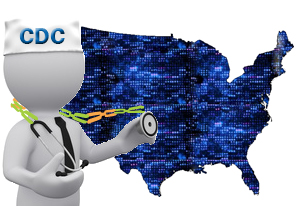Category: genetics
Shall We Have Pie or Stew?

Understanding Genetic and Environmental Causes of Human Disease A recent article in the Archives of General Psychiatry by Hallmayer et al. discussed the role of genetic and environmental factors in autism and autism spectrum disorders (ASD). The study was a heritability analysis of 192 pairs of twins, which attributed 37 percent of the variation in Read More >
Posted on by 15 CommentsWe Asked…You Answered…Thank You!

What are the key priorities for the field of public health genomics for the next five years? What can stakeholders accomplish together to achieve measurable health impact by applying genomics to significant public health issues? On June 30, 2011 the Centers for Disease Control and Prevention (CDC) issued a Request for Information (RFI) for comments, Read More >
Posted on byMedications for the Masses? Pharmacogenomics is an Important Public Health Issue

Adverse drug events are a serious public health problem. Consider the following facts: an estimated 82% of American adults take at least one medication and 29% take five or more; 700,000 emergency department visits and 120,000 hospitalizations are due to adverse drug events annually; $3.5 billion is spent on extra medical costs of adverse drug Read More >
Posted on by 3 CommentsWhat are the Priorities for Public Health Genomics 2012-2017?
Since 1997, the Office of Public Health Genomics (OPHG) at the Centers for Disease Control and Prevention (CDC) has worked to integrate genomics into public health research, policy, and programs. Our driving force is to improve interventions designed to prevent and control the country’s leading chronic, infectious, environmental, and occupational diseases. OPHG’s efforts focus on conducting Read More >
Posted on by 1 CommentGenome vs. Genome: E. Coli Sprouts in Germany

Public health officials around the world are watching what they hope is the final stage of a massive outbreak of Shiga toxin-producing Escherichia coli (STEC) infections that began in Germany in May. On June 10, officials of the German federal disease control center, the Robert Koch Institut, announced that raw vegetable sprouts were indeed the Read More >
Posted on by 5 CommentsFeeling the Genomic Pulse of the United States

A healthcare provider takes a good clinical history, feels the patient’s pulse, performs a good physical examination, and orders laboratory tests to diagnose and manage a health problem. In a similar manner, public health programs feel the pulse of the population by collecting data through population surveys, surveillance systems and health statistics to assess the Read More >
Posted on by 3 CommentsTell Me More about Telomeres

Researchers, journalists, and inquiring minds want to know more about telomeres, which seem to hold clues to human aging and age-related diseases. Could telomeres provide an answer to questions like “How long will I live?” or “Will I get cancer?” What are telomeres? Telomeres are structures at the ends of chromosomes that contain repetitive stretches Read More >
Posted on by 2 CommentsWhat is Public Health Genomics? A Day in the Invisible Life of Public Health Genomics
Public health usually works behind the scenes and many people aren’t even aware of public health programs. When you get sick you visit your doctor and get advice and treatment to make you feel better. Doctors and other medical professionals work to improve health one person at a time, but public health professionals focus on improving Read More >
Posted on by 11 CommentsNew Blog: Genomics Matters
Genetics has a role in diseases of public health significance that affect infants, children, and adults. Our genes influence our response to drugs, infectious threats, and environmental exposures. More than 2,000 genetic tests are in use today and many more are coming. In spite of the rapid pace of discovery in genetics, we are still in Read More >
Posted on by 43 Comments

